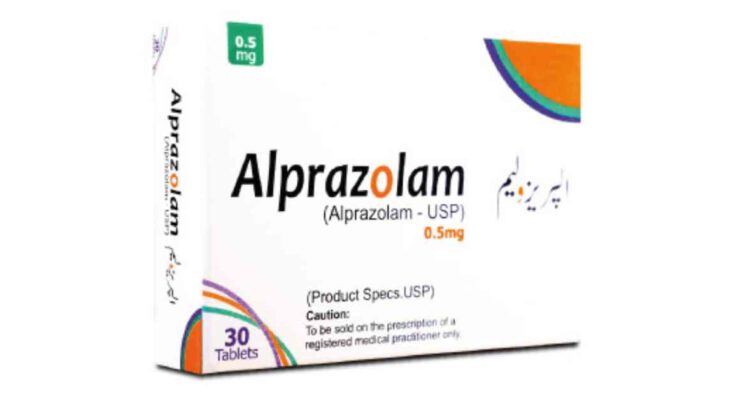Table of Contents
Welcome to our comprehensive guide on Alprazolam – a medication commonly prescribed for anxiety disorders. If you’re curious about what Alprazolam is, its uses, side effects, and how to take it safely, you’ve come to the right place! Join us as we delve into the history of this medication, explore its various forms, address common misconceptions and controversies surrounding it, and provide insights into alternative treatment options. Let’s navigate through the world of Alprazolam together!
What is Alprazolam?
Alprazolam, often sold under the brand name Xanax, belongs to a class of medications known as benzodiazepines. It acts on the central nervous system to produce a calming effect by enhancing the effects of a GABA neurotransmitter. This neurotransmitter helps regulate brain activity and reduce feelings of anxiety.
Primarily prescribed for anxiety disorders, Alprazolam can also be used to treat panic disorders and certain conditions like insomnia caused by anxiety. It is classified as a short-acting benzodiazepine, meaning it has a rapid onset of action but also a relatively short duration in the body compared to other benzodiazepines.
Due to its soothing properties, Alprazolam is known for its potential for abuse and addiction if not taken as directed by a healthcare professional. It’s crucial to follow your doctor’s instructions closely when taking this medication and never exceed the prescribed dosage or duration of use.
History of Alprazolam
Alprazolam, commonly known by the brand name Xanax, has a rich history that dates back to the 1960s. Initially developed by Upjohn Laboratories, this benzodiazepine was first approved by the FDA in 1981 for treating anxiety disorders and panic attacks.
Over the years, Alprazolam gained popularity as an effective medication for managing various forms of anxiety. Its fast-acting nature made it a go-to choice for individuals seeking immediate relief from symptoms like restlessness and tension.
Despite its widespread use, Alprazolam also faced scrutiny due to its potential for abuse and dependence. This led to stricter regulations on its prescription and dispensing practices to prevent misuse and addiction among patients.
Today, Alprazolam is still prescribed under careful supervision by healthcare professionals who weigh the benefits against the risks associated with its use. Understanding its historical context helps us appreciate how far we’ve come in optimizing treatments for mental health conditions.
The Uses of Alprazolam
Alprazolam is primarily used to treat anxiety disorders, such as generalized anxiety disorder (GAD) and panic disorder. It enhances the effects of a natural chemical in the body called gamma-aminobutyric acid (GABA), which helps calm the brain and nerves.
In addition to anxiety disorders, Alprazolam may also be prescribed for other conditions like insomnia, muscle spasms, and alcohol withdrawal symptoms. However, it is essential to note that this medication should only be used under the guidance of a healthcare professional due to its potential for abuse and dependence.
When taken as directed by a doctor, Alprazolam can help manage symptoms of anxiety and improve the quality of life for those struggling with these conditions. Following dosage instructions carefully and not exceeding recommended limits is crucial to avoid adverse effects.
5 Common Side Effects of Alprazolam
Alprazolam, like any medication, comes with its fair share of potential side effects. It’s essential to be aware of these possible outcomes when considering its use for anxiety management.
1. Drowsiness: One common side effect is feeling exhausted after taking Alprazolam. This can impact your daily activities and productivity.
2. Dizziness: Some individuals may experience feelings of lightheadedness or vertigo while on this medication. It’s essential to avoid tasks that require focus and balance if experiencing dizziness.
3. Cognitive Impairment: Alprazolam can affect some users’ cognitive functions, such as memory and concentration. Be mindful of any changes in mental clarity while using this drug.
4. Nausea: Another common side effect is nausea or stomach discomfort after taking Alprazolam. It’s crucial to take the medication with food if you experience gastrointestinal issues.
5. Dependency: Long-term use of Alprazolam can lead to physical dependence and withdrawal symptoms upon discontinuation, making it crucial to follow a doctor’s guidance when tapering off the medication.

Different Forms of Alprazolam
Alprazolam, commonly known by its brand name, Xanax, is available in various forms to accommodate different patient needs. The most common form is the immediate-release tablet, which is typically taken multiple times a day as needed for anxiety or panic attacks.
Extended-release tablets are also available for those who prefer a more controlled release of the medication throughout the day. These are designed to be taken once daily and provide a steady stream of Alprazolam over an extended period.
In addition to tablets, Alprazolam is also available in liquid form for individuals who have difficulty swallowing pills or need more precise dosing. The liquid formulation allows for easy measurement and administration.
Alprazolam can be administered orally for acute situations where rapid relief is necessary. It is a disintegrating tablet that dissolves quickly in the mouth without water.
The different forms of alprazolam offer flexibility and options for patients with varying preferences and needs when it comes to managing anxiety disorders.
Side Effects and Risks
When taking Alprazolam, it’s essential to be aware of the potential side effects and risks that may come along with it. Like any medication, Alprazolam can cause some unwanted effects that vary from person to person. Some common side effects include drowsiness, dizziness, and confusion.
In addition to these mild side effects, there are also more severe risks associated with alprazolam use. These can include issues like respiratory depression, memory problems, and even the potential for addiction or dependence on the medication. Discussing these risks with your healthcare provider before starting treatment is crucial.
Follow your doctor’s recommendations when taking Alprazolam to minimize the risk of adverse side effects. Never exceed or mix the prescribed dosage with other substances without medical guidance.
If you notice any concerning symptoms while taking Alprazolam, such as difficulty breathing or severe dizziness, seek immediate medical attention. Your health should always be a top priority when managing anxiety disorders and using medications like Alprazolam.
How to Take Alprazolam Safely
When taking Alprazolam safely, there are a few key things to remember. Always follow your doctor’s prescribed dosage and never exceed it without consulting them first. It’s essential to take the medication exactly as directed to avoid potential risks or side effects.
Additionally, be mindful of how often you’re taking Alprazolam. Avoid increasing the frequency of doses on your own and stick to the schedule provided by your healthcare provider. Remember that consistency is crucial to managing anxiety effectively with this medication.
Furthermore, never mix Alprazolam with alcohol or other substances unless specifically approved by your doctor. Combining certain drugs can lead to dangerous interactions and exacerbate side effects.
Make sure to communicate openly with your healthcare provider about how you’re feeling while taking Alprazolam. If you experience any concerning symptoms or changes in mood, don’t hesitate to reach out for guidance and support. Your health and well-being should always come first when using this medication for anxiety management.
Alternative Treatments for Anxiety Disorders
When it comes to managing anxiety disorders, exploring alternative treatments can open up a world of possibilities beyond traditional medication.
Mind-body therapies like yoga and meditation have shown promising results in reducing anxiety symptoms by promoting relaxation and mindfulness. These practices can help individuals cultivate inner peace and resilience in stress.
Acupuncture is another alternative treatment that has gained popularity for its ability to balance energy flow within the body, potentially alleviating anxiety symptoms. By stimulating specific acupoints, acupuncture aims to restore harmony and promote overall well-being.
Herbal supplements such as passionflower, lavender, and valerian root are also believed to have calming properties that help ease anxiety. However, it’s essential to consult with a healthcare provider before incorporating these supplements into your routine.
In addition to these alternatives, cognitive-behavioural therapy (CBT) is a widely recognized psychotherapy approach that focuses on changing negative thought patterns and behaviours associated with anxiety. CBT equips individuals with practical tools to manage their symptoms effectively.
Exploring alternative treatments for anxiety disorders allows individuals to tailor their healing journey according to their unique needs and preferences.

Misconceptions and Controversies Surrounding Alprazolam
Misconceptions and controversies surrounding Alprazolam have been prevalent in discussions about mental health. One common misconception is that Alprazolam is a cure-all for anxiety disorders when, in reality, it is just one tool in the treatment toolbox. Some believe that taking Alprazolam will instantly solve all their problems, but it’s important to remember that medication alone may not address the root causes of anxiety.
Another controversy revolves around the potential for addiction to Alprazolam. While it can be habit-forming if misused, when taken as prescribed under medical supervision, the risk of addiction decreases significantly. It’s crucial to follow your healthcare provider’s guidelines and never self-medicate with Alprazolam.
There are also concerns about side effects like drowsiness or impaired coordination. These side effects are possible but vary from person to person and can often be managed with proper monitoring by a healthcare professional. It’s essential to weigh the benefits against the risks before starting any medication regimen involving Alprazolam.
Navigating these misconceptions and controversies requires open communication with your healthcare provider and a willingness to explore alternative treatments. Everyone’s journey towards mental well-being is unique, so finding what works best for you should always be the priority.
Seeking Professional Help and Support
When it comes to managing anxiety disorders and seeking help for mental health issues, reaching out to a professional is crucial. Whether you’re considering therapy, counselling, or medication like Alprazolam, having the support of a trained expert can make all the difference in your journey towards better mental well-being.
Therapists and psychiatrists have the knowledge and experience to provide personalized treatment plans tailored to your needs. They can offer guidance, tools, and coping mechanisms to help you navigate challenging emotions and situations effectively.
Professional support goes beyond just prescribing medication – it involves creating a safe space for open dialogue where you can express your concerns without judgment. The right therapist can empower you to understand the root causes of your anxiety and work towards long-term solutions for lasting change.
Remember that asking for help is not a sign of weakness but rather a courageous step towards prioritizing your mental health. Seeking professional assistance shows strength and determination in taking control of your well-being.
Conclusion: Alprazolam
Alprazolam is a widely used medication for managing anxiety and panic disorders. It has a long history of helping individuals cope with these conditions, but it also has its share of side effects and risks.
When taking Alprazolam, it’s essential to be aware of the potential side effects such as drowsiness, dizziness, and confusion. Different forms of the medication are available, including extended-release tablets and oral solutions.
While Alprazolam can be effective in treating anxiety disorders, it’s crucial to take it safely under medical supervision. Alternative treatments like therapy or lifestyle changes may also benefit some individuals.
Despite misconceptions and controversies surrounding Alprazolam use, seeking professional help and support is critical to managing anxiety effectively. Everyone’s experience with Alprazolam may vary, so consulting with a healthcare provider is always recommended.
Understanding the uses, side effects, risks, and safe practices associated with Alprazolam is essential for anyone considering this medication for anxiety management. By staying informed and seeking appropriate guidance, individuals can make informed decisions about their mental health treatment plans.

Latest Posts [https://besaras.com/]










